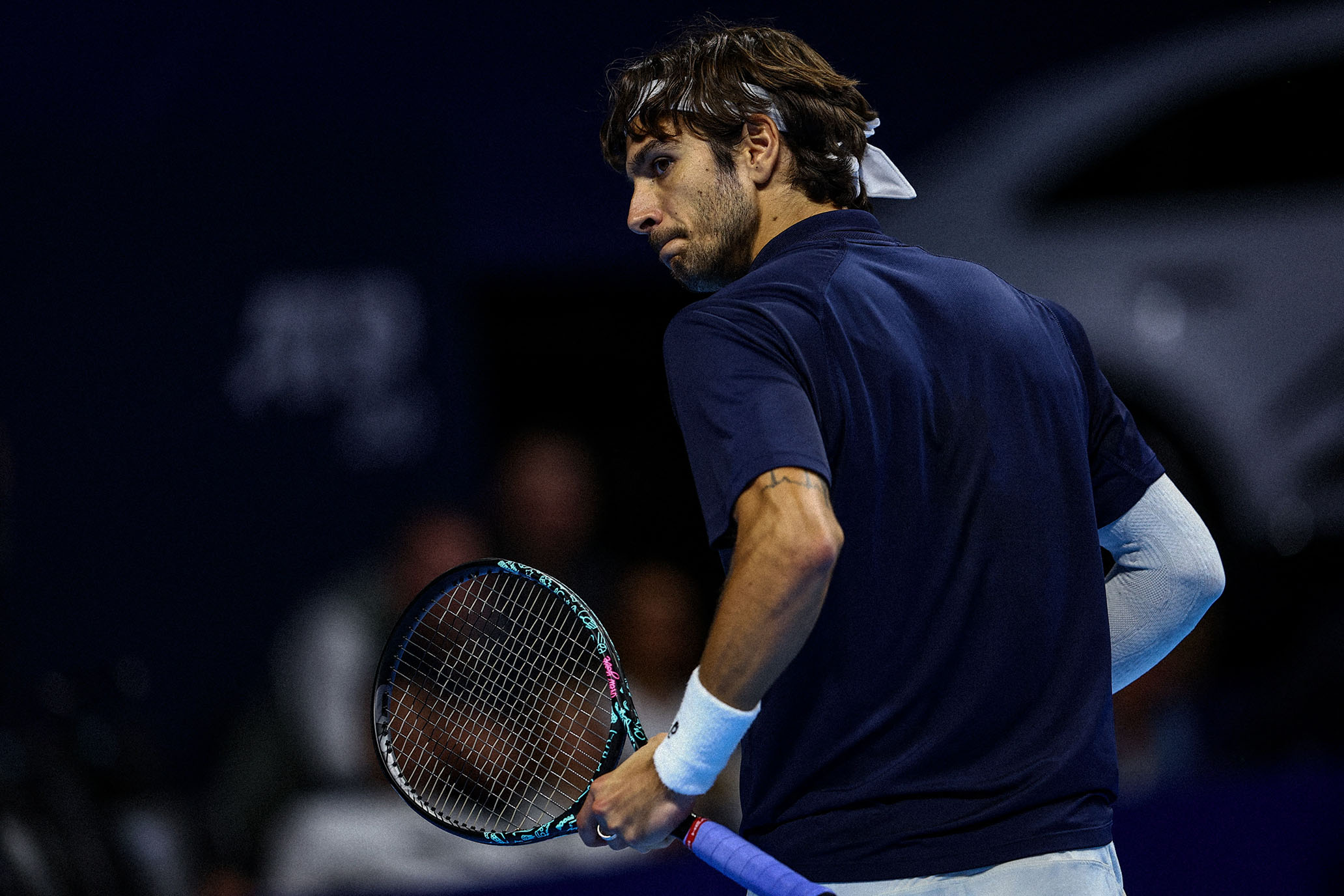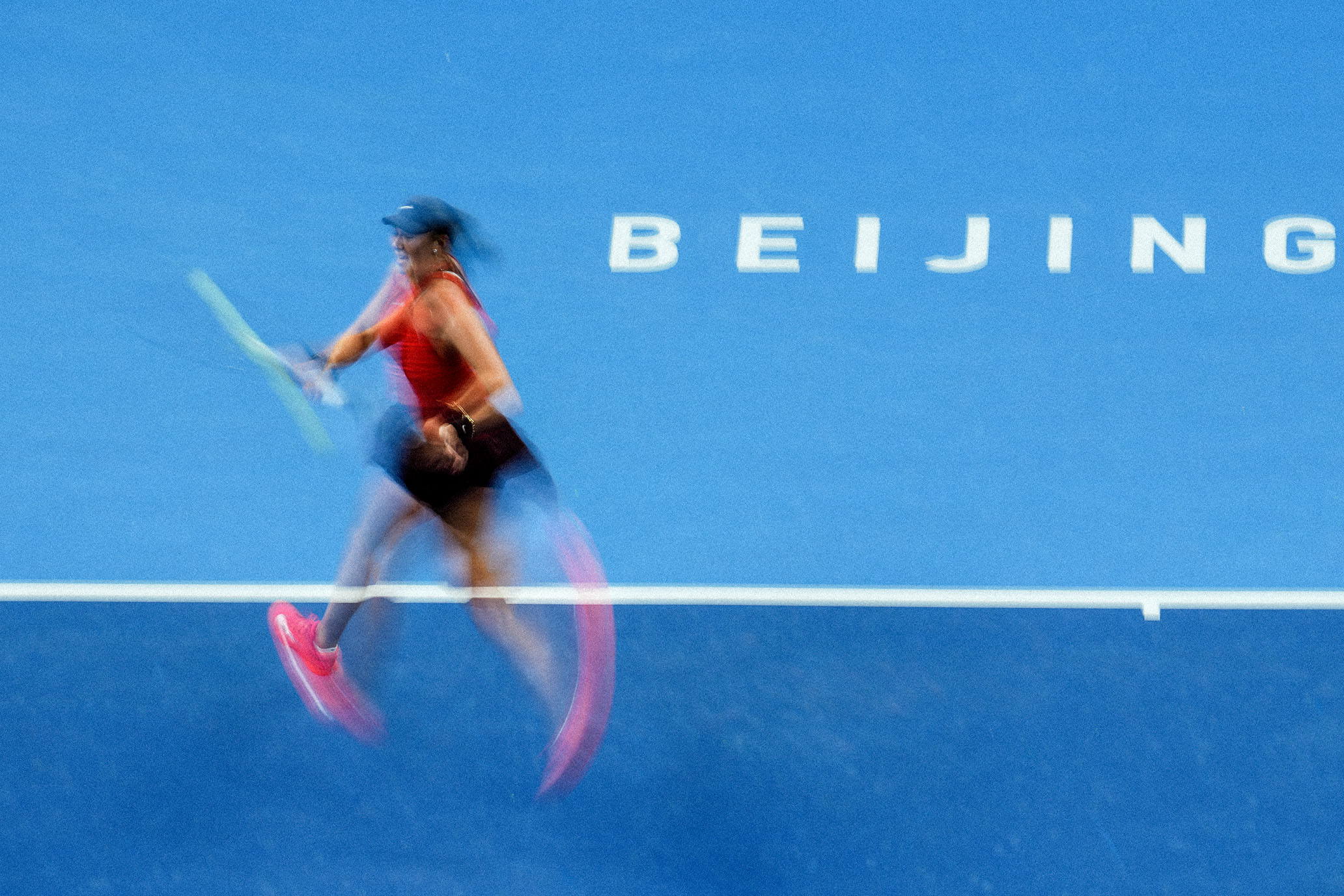Red-Letter Rout
Red-Letter Rout
After their clash in Madrid, Coco Gauff and Iga Swiatek are moving in opposite directions.
After their clash in Madrid, Coco Gauff and Iga Swiatek are moving in opposite directions.
By Ben RothenbergMay 1, 2025

Iga Świątek during her loss to Qinwen Zheng at the Paris Olympics last summer. It’s been rough sledding since then. // Getty

Iga Świątek during her loss to Qinwen Zheng at the Paris Olympics last summer. It’s been rough sledding since then. // Getty
When tracing the arcs of tennis history, the red-letter dates are too often assigned to the epic contests, the duels between two warriors going toe to toe for hours on end with nothing separating them, until one narrowly ekes past the other.
But two players being evenly matched doesn’t foretell much, really. More frequently, the most important and decisive battles that prove to be inflection points in history are the routs, the knockout punches, the bloodbaths. Think of 81st-ranked Serena Williams stomping top-seeded Maria Sharapova in the 2007 Australian Open final, and remember that their head-to-head was knotted at 2–2 before that match set it on a course that would end with a 20–2 final tally.
Similarly, when Rafael Nadal smote Roger Federer 6–1, 6–3, 6–0 in the final of the 2008 French Open, it was the most important match the two played that year: The landslide changed the tennis topography enough for Nadal to win their storied Wimbledon final rematch a month later.
The tennis history book’s chapters on Iga Swiatek, still only 23 years old, should be far from over. But inflection points are emerging, and the 6–1, 6–1 thwacking Swiatek received from Coco Gauff in the Madrid Open semifinals on Thursday already jumps off the page.
Swiatek famously idolizes Nadal, and her collection of clay-court laurels pales only to his in this century. But in this phase of her already legendary career, Swiatek evokes Federer more. After years of gliding atop the world, Federer could barely hide his annoyance when Nadal—and then Novak Djokovic—dared to shake the ladder atop which Federer felt so very comfortable. Federer was so regal and so beloved at the top, a rare despot with a sparkling approval rating, that he never relished the muck of nonceremonial reelection campaigns.
Swiatek wasn’t quite as popular as Federer, but she was nearly as dominant. She ruled with such an iron fist—and an iron wrist capable of devastating topspin—for so long that she didn’t need to be gritty. Swiatek made wins short and sweet; her famous “bakery” of 6–0 and 6–1 sets showed a starchy sensibility as a champion. Double-digit win streaks became her norm. She racked up her fifth major title just after her 23rd birthday last spring, winning the French Open after also winning the lead-ups in Madrid and Rome.
But after taking several tough punches, starting with a loss at her beloved Roland-Garros in last year’s Olympic semifinal to Zheng Qinwen, Swiatek has suddenly been exposed as having something of a glass jaw, particularly deep into tournaments.
The autumn suspension Swiatek served for testing positive for a banned substance—not her fault, the tribunals ruled, since it came from provably contaminated melatonin—was only a month long. But because it made the top spot in the rankings out of reach for her, its psychic effects on her seem to have lasted much longer. That loss to Zheng was the first of what’s become six consecutive losses in semifinal matches.
What’s been most remarkable about this chapter has been Swiatek’s wallowing. Her long social media post after her loss in the Indian Wells semifinals read, in parts, like a monologue Parker Posey’s White Lotus character Victoria Ratliff could’ve delivered. Swiatek admitted that, after so long atop the sport, she couldn’t cope with the drudgery of being second-best in the world. When you’ve become accustomed to private jets, I guess, a long-haul flight in first class can feel like steerage. I appreciated Swiatek’s honesty, especially because it wasn’t particularly impressive.
The most jarring status-symbol change for Swiatek might be her matches against Gauff. After all, this head-to-head started out as one that made the Serena-Sharapova matchup look equitable by comparison: Swiatek won 11 of the first 12 matches she played against Gauff. All 11 of those Swiatek wins came in straight sets, and only twice in the 22 sets in those 11 wins did Swiatek even lose as many as five games in a single set. The undecet included five wins on clay and three consecutive wins at Roland-Garros, including the 2022 final.
But since Swiatek’s suspension and subsequent staggering, Gauff has impressively turned the tables on her oppressor in a way Sharapova never could manage. When Gauff beat Swiatek last October in the WTA Finals in Riyadh, it could perhaps be written off as an outlier given the suspension Swiatek had only just finished serving. When Gauff beat Swiatek again in the opening week of the 2025 season, in the United Cup final in Sydney, it was a high-octane affair in which both players were rested and sharp, but Gauff managed to maintain the slight edge she’d had. What had been a series of foregone conclusions was officially interesting again.
But when Gauff made it three in a row on Thursday in Madrid, she beat Swiatek silly in a way that even Swiatek had never quite done to Gauff in those 11 lopsided wins. Gauff lost the first game but belted three clean down-the-line winners during it, and then reeled off 11 straight games to put herself up 6–1, 5–0. Swiatek couldn’t make any dents into the Gauff serves she used to pummel. Instead of Gauff spraying forehand errors, it was Swiatek missing big.
On the penultimate changeover of the match, Swiatek sat sobbing with a towel over her head. The scene was so grim that the normally non-effusive Casper Ruud, fresh off his own win in Madrid, responded to the clip by sending Swiatek some chin-up cheer and a string of peppy emojis on Twitter: “Hey @iga_swiatek keep your head up. Like millions of other people I love watching you play. Not your day today, but you inspire so many and you’ll be back stronger than ever!!”
There are other factors at play, perhaps: hours after the match and after this piece was written, Polish media reported that Swiatek’s grandfather had passed away before the Madrid tournament, which may have affected her this week.
Where Swiatek goes next from here isn’t clear; in the short term, probably down. She could fall to No. 3 if Gauff wins the Madrid final. Then she has another precarious 3,000 ranking points expiring soon from last year’s titles in Rome and Paris. In a worst-case scenario, Swiatek could find herself on the outskirts of the top 10 with early losses the rest of this month.
It would be a jarring change of zip code for Swiatek, who has spent pretty much her entire career as a tour-level player ranked inside the top 2, including 125 weeks at No. 1 that’s already seventh-most in WTA history.
Every inch of prime real estate in tennis is earned, of course, and Swiatek absolutely deserved everything she had. And because she’s still so young and physically healthy, there’s no reason why Swiatek can’t get back to the top again. The main battle she has next, though, is going to be with herself: to prevail over her ego and conquer the feeling that it’s a disaster to be something less than perfect. Foremost, to put it much more bluntly than Casper Ruud did, Swiatek has to stop feeling so damn sorry for herself for not being an untouchable No. 1 anymore.
That’s not an easy battle for any person, especially one accustomed to so much, but it’s what Swiatek has to do to turn the page from this red-letter defeat.

The Hopper
—CLAY Tennis on Beatriz Haddad Maia’s US Open run.
—Giri on Iga Swiatek’s loss to Jess Pegula.
—Jon Wertheim’s mailbag is full this week.
—Sara Errani and Andrea Vavasori have won the US Open mixed doubles.
—Tim Newcomb on Taylor Fritz and Asics.



